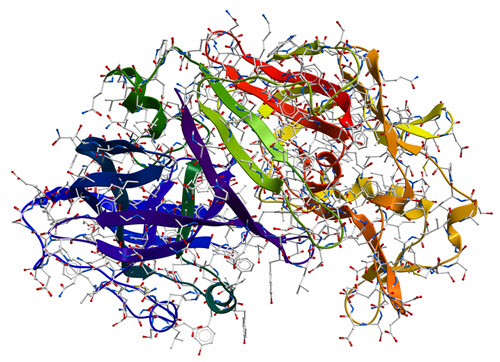Why Your Body Might Be Starving For Protein


Our human brains LOVE to jump to conclusions. It just seems so natural that if we put food into our mouths and chew it that that food will be “digested.” It will feed us the micro and macronutrients we need… right?
Not exactly.
Meet Annie, a friend of mine. We were talking recently and she told me that a few years ago she was struggling with low energy and brain fog. As a professional and active woman, this was really causing her a lot of unhappiness.
And the doctors she was seeing at the time offered zero help.
She was deep in the research trying to get herself better when she realized she might have a protein problem — despite eating a diet full of healthy meats and vegetables.
She wondered, “How could that be possible?”
Soon, she discovered something surprising… something that didn’t make logical sense, but she was at her wit’s end and ready to try anything.
She read about Hypochlorhydria or low stomach acid (I actually wrote about it in this article that includes 3 common signs of low stomach acid)… and it was then that she realized it was possible she might not be digesting the meat she was eating.
She said she immediately started supplementing with Betaine HCL… and that was the day everything changed.
She told me she soon had energy that had been missing for years. It was like night and day.
Annie, whose name I’ve changed, isn’t alone. Her story is one that I’ve heard over and over.
Even If You Eat Meat, Your Body Could Be Starving for Protein
I believe it’s a tragedy that you may be working so hard talking to farmers, going store to store, trying to find the most sustainable and humanely raised meat…
Spending double or triple the cost of the factory-farmed junk meat, only to pass it through into the toilet and not reaping the rewards of all that time, energy, and money.
But it’s happening. And it’s far more common than you may think. Heck, it happened to me for many months.
Here are some signs and symptoms that despite your diet, you might have a protein absorption problem:
- Low energy
- Brain imbalances
- Weight loss
- Weight gain
- Muscle weakness and wasting
- Swelling due to water retention (edema)
- Low blood pressure
- Low heart rate
- Blood sugar imbalances
- Immune system dysregulation
- Liver problems
- Anemia
- Bone health disorders
Protein is very important for a healthy, happy mind and body.
Proteins are bigger molecules that are broken down into amino acids.
Neurotransmitters, muscle tissues, bones, and insulin all require amino acids… they play a role in every cell in your body actually.
It’s no wonder then, if you are lacking in these amino acids your health is going to be suffering.
Protein Malnutrition Is a Serious Condition (and Might Be Affecting You Right Now)
Dr. Latham, director of the Program in International Nutrition at Cornell University claims that malnutrition is a frequent cause of death and disease in third world countries. According to this paper, Protein-energy malnutrition (PEM) affects 500 million people and kills 10 million annually.
With the understanding that we’ll never know the exact numbers, I think 10 million is likely the high limit and the true number is below that. Regardless, we are talking about millions of people.
And that’s a serious issue, one those of us lucky enough to live in developed nations are likely only exposed to when seeing sad pictures of children looking like this…

This is protein malnutrition at it’s worst.
However, that doesn’t mean we are free and clear, as even a small amount of protein malnutrition is hypothesized to be a really big problem.
Bob Lanier, a former biology professor at Jesuit College Preparatory School of Dallas, claims that in developed countries protein deficiency is more common today than statistics might reveal. Lanier is quoted around the internet as providing a variety of data and connects widespread protein deficiency among low-income minority families to explain poor academic performance. I couldn’t actually find it.
This study does partially support Bob’s idea showing lower protein intake in certain minority groups.
Here’s a study showing that protein and micronutrient enhanced formulas fed to preterm babies can drastically alter intelligence. Here’s a rat study talking about neuron loss due to a low-protein diet. In general, there’s a lack of research looking into this…
But what I want to make clear is that clinical and anecdotal stories of people in western countries who were struggling with issues mentioned above, brain fog, energy, blood sugar, and weight issues are everywhere. Annie is just one of these. They were eating diets containing plenty of meat and when they helped their body digest protein better — their issues were either greatly improved or eliminated.
How Meat and Protein Gets Digested and Absorbed
When you take a bite of meat (filled with protein) there’s a complex communication that the body begins having between your mouth and your stomach. There are all kinds of unconscious processes that kick into high gear creating gastrin juice (basically stomach acid soup) for you to actually absorb the amino acids inside this meat and other micronutrients like iron, zinc, and B12.
The main component of this gastric juice is hydrochloric acid (HCL). You need the right amount of HCL in your stomach to denature the proteins and activate the enzyme pepsin. Once the HCL unfolds the complex protein structure, you need enough pepsin to cleave them apart so that you can absorb them in your small intestine.
The pH of the stomach should be very acidic, in the range of 1.5-3.5. Pepsin functions best around a pH of 2. If the pH is too high, then Pepsin may not even be activated to break down the proteins.
There are other parts of stomach acid, like intrinsic factor. If the meat isn’t broken down and if there’s not enough intrinsic factor released, you will NOT be able to absorb vitamin B12.
In other words, if your stomach fails to get this right then that grass-fed steak you’re eating is mostly wasted on bacteria and sewer water. And you may end up starting to have protein malnutrition.
3 Steps to Make Sure You’re Digesting Protein
As you can see, there are two really important things you want enough of, HCL and Pepsin. If you have any of the symptoms mentioned above or if you’re suffering from any signs of low stomach acid, then you’re a great candidate to test to see if your issues are protein malnutrition related.
Step 1: Ensure adequate HCL in stomach
The best way is to take a Heidelberg test, but if you’d rather not wait around you can try 2 quick at-home tests that will give you a clue if you need more. The first is trying some ACV before meals. If this helps, that’s a great sign you need more acid. Or what most people do is try adding in more acid in the form of Betaine HCL and see how their body reacts.
Step 2: Make sure you have enough enzymes
Remember, pepsin is the most important protein enzyme, however, there are others. One idea to test along with ensuring proper HCL levels is adding more pepsin and other protein enzymes into your diet. The best way to do this is with Betaine HCL with pepsin and a well-rounded enzyme, like HoloZyme, that includes a large dose of activated enzymes.
You should know in a week or two if it’s helping. Don’t be afraid to try 2, 3, even 4 enzyme pills per meal.
Step 3: Figure out why this is happening and fix it!
The two steps above can change your life if you need them, but you’ll be stuck taking those pills every day of your life unless you get down to the root issues of why your stomach acid isn’t working properly.
This is something I’ve researched heavily and worked hard on in my own life. In fact, I just had a 90-minute conversation with Dr. Steven Sandberg-Lewis (a Gastroenterology expert) that blew my mind all about stomach acid, heartburn, and digestion.
I can’t wait to share everything I’ve learned – old and new.
You can find out more about stomach acid, GERD, and heartburn here
I’m simplifying all my years of research, experimentation, and talks with mentors like Dr. SS-L and putting it into actionable steps for you. This information is not available anywhere online and most of it I’ve never written about. Why? Because a short article can’t and won’t do it justice.
We need to go deeper than that (but not textbook deep).
I can tell you this, though… after you listen to the call, you’ll likely know so much more than your doctors about stomach acid, GERD, Gastroparesis, and Hiatal hernias that they might be offended in your next appointment.
Sign up here: http://heartburnhelp.scdlifestyle.com/
In the meantime, tell me in the comments below what happens when you try upgrading your stomach acid.
-Steve
Did You Like this Article?
Subscribe to our newsletter to receive email notifications, some ways to find relief, and next steps.
